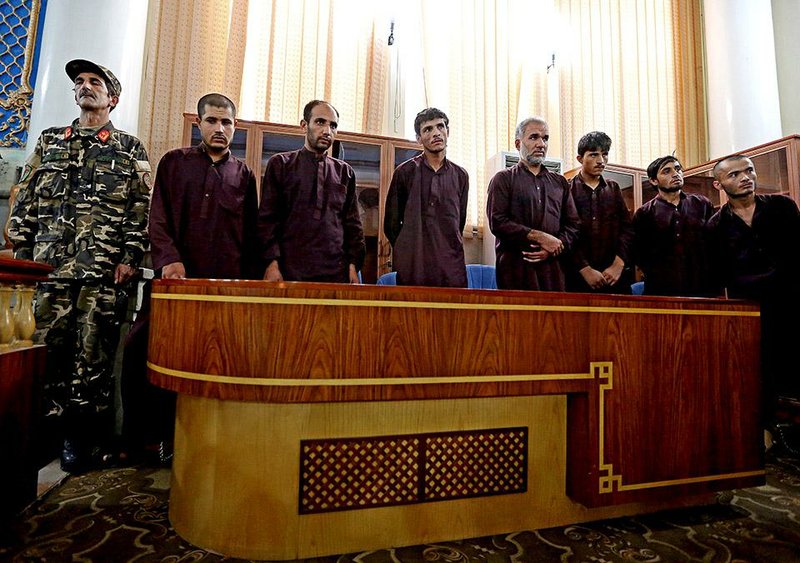KABUL, Afghanistan -- The seven suspects in the rape of four women had not even gone to trial when President Hamid Karzai assured a visiting delegation of female politicians that he wanted them to be executed -- after their convictions, of course.
While he generally opposes the death penalty, Karzai said, in this case he was ready to make an exception.
"I told them to arrest these people, and I expect the chief justice will give them capital punishment," Karzai said. "And by God's willingness, we will implement it immediately."
On Sunday, all seven defendants were convicted and sentenced to death.
The four women -- one of them pregnant, another just 18 and one elderly -- were returning, all with their husbands, from a wedding in the Paghman district of Kabul province, which is a 15-minute drive from the capital, when their cars were stopped by 10 men, some of them dressed in police uniforms and carrying assault weapons. The women were robbed, beaten and raped, then returned to their humiliated husbands.
The crime took place Aug. 23. Last Tuesday, seven of the 10 suspects were arrested; the other three have been identified but not yet caught. The police said they had stolen the uniforms and were not real officers. Over the next four days, the attorney general investigated and announced his findings, the confessions of the seven men were broadcast on television, and the rape victims, dressed in burqas and chadors, were allowed to confront their attackers in person and on camera, grabbing those responsible by the lapels.
By Saturday, Karzai had promised them the death penalty, and on Sunday, their trial opened. The trial was televised live, a rare occurrence in Afghanistan, where most trials are effectively closed to the public. Prosecutors read the defendants' confessions as the seven men sat in the dock and made no effort to speak on their own behalf. One had his arm in a cast, and most of them appeared to have facial bruises. Before the day's end, they were all convicted and sentenced.
Oddly, the court did not try them on rape charges, apparently to spare their victims the ordeal of forensic examinations and embarrassing testimony; instead, their convictions were for adultery and armed robbery, both of which are capital offenses in Afghanistan. The seven all received the death penalty, two or three times in each case on different charges. Hanging is the usual means of execution.
During the two weeks between the assaults and the trial, thousands of Kabul residents poured into the streets to demand a speedy conviction, the execution of the perpetrators and to warn government officials not to take the customary bribes to make the case go away.
"They should be executed at the spot where they committed the crimes," said Nasima, a teacher who was among those chanting the slogan, "Only hanging is acceptable" on Sunday outside the Supreme Court, where the trial was held to accommodate large crowds. "People should see the faces of the convicts during hanging, because if their faces are covered, it would mean for us that the government hanged someone else."
The last time a hanging took place in public in Afghanistan, it was during the Taliban regime and in the National Stadium.
Most people also seemed impatient with the convicts' constitutional right to appeal, a procedure that could take up to 50 days, after which the president has to ratify any execution order.
Even many civil-rights advocates supported the calls for swift executions. One women's rights activist, Jamila Mujahid, approvingly quoted prisoners at the Pul-e-Charki jail as saying, "If the perpetrators of the Paghman gang rape are not hanged, we will kill them here when they are imprisoned."
Heather Barr, a Human Rights Watch researcher on women's rights in Asia, noted that in many rape cases in Afghanistan, the government often jails the victim for adultery rather than arresting the rapist.
"In this case, the government has reacted but has done so at the expense of justice," Barr said, calling the conviction a "show trial" that did not comply with Afghan law.
She cited "the speed of the trial, the lack of evidence and argument" on the defendants' behalf, "the alleged mistreatment of the defendants and Mr. Karzai's speaking out in favor of their execution before their case was even heard."
Information for this article was contributed by Jawad Sukhanyar of The New York Times.
A Section on 09/08/2014

